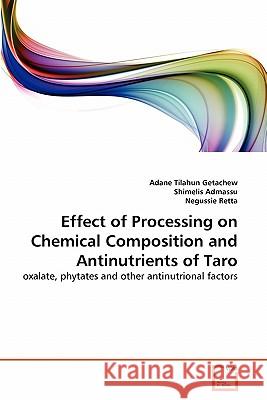Effect of Processing on Chemical Composition and Antinutrients of Taro » książka
Effect of Processing on Chemical Composition and Antinutrients of Taro
ISBN-13: 9783639308594 / Angielski / Miękka / 2010 / 100 str.
Taro is a very important crop in the pacific islands, the Caribbean, Japan, China, west and east Africa. It is reach in carbohydrate and it is an excellent source of potassium and fiber. However Like most plant origin foods taro also contains a variety of anti-nutritional and toxic components. Taro contains oxalates, phytates trypsin and amylase inhibitors, phytates, tannins and cyanide in some cultivars. This book, therefore provide the necessary information on chemical composition the levels of antinutritional factors, effective processing methods in reducing these factors in taro. Moreover the book focused on how the different processing methods affect some physicochemical properties of different taro cultivars grown in Ethiopia. This book is useful for food scientists, nutritionists and agricultural professionals who work in root and tuber crops area.
Taro is a very important crop in the pacific islands, the Caribbean, Japan, China, west and east Africa. It is reach in carbohydrate and it is an excellent source of potassium and fiber. However Like most plant origin foods taro also contains a variety of anti-nutritional and toxic components. Taro contains oxalates, phytates trypsin and amylase inhibitors, phytates, tannins and cyanide in some cultivars. This book, therefore provide the necessary information on chemical composition the levels of antinutritional factors, effective processing methods in reducing these factors in taro. Moreover the book focused on how the different processing methods affect some physicochemical properties of different taro cultivars grown in Ethiopia. This book is useful for food scientists, nutritionists and agricultural professionals who work in root and tuber crops area.











